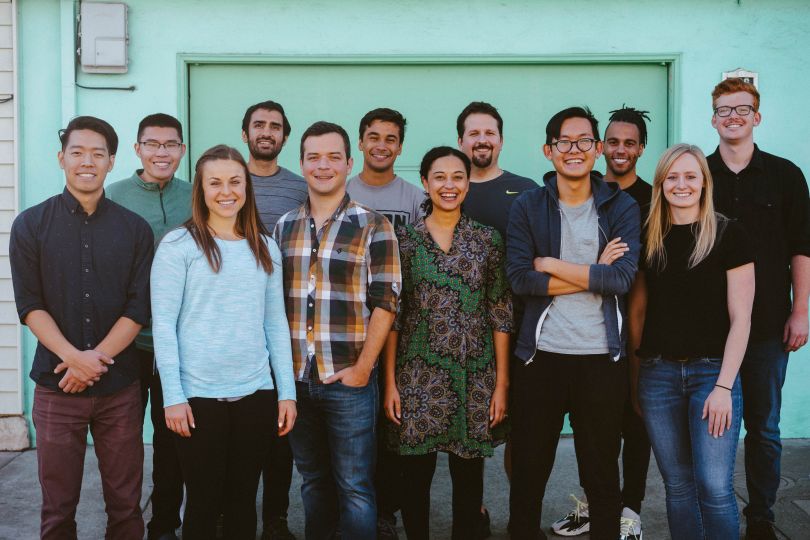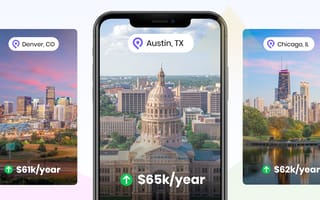Michael Chambers was fed up with his job search. He’d been on the hunt for a new role as a software engineer in Atlanta for months and wasn’t hearing back from employers. For most of Chambers’ career, he’d worked in genetic research labs, but on the software side, not the research side. He worried his resume was confusing to potential tech employers and he wasn’t sure how to market his skills.
In the midst of his job search, Chambers came across a new program that promised to help land him an offer. San Francisco-based Placement bills itself as a talent agency for job seekers, specializing in resume help, interview prep and salary negotiation for careers in the tech industry. Its users don’t pay anything upfront when they join, and instead agree to share part of their income with the company — up to 10 percent for 18 to 36 months — until they’ve paid off the cost of the program.

Michael landed four job offers within a month of completing the program, and his story is one of Placement co-founder Sean Linehan’s favorite illustrations of the impact a company like his can have.
“Being good at your job and being good at getting a job are two different things,” Linehan said. “We help our customers hone their stories and explain them in terms employers can understand.”
The Rise of Income Sharing
Placement is one of a growing number of tech job search assistance programs in San Francisco that offer income sharing agreements — or ISAs. And although they’re based in SF, most programs will help tech workers land jobs anywhere in the country, often decreasing their costs of living while increasing their salaries.
Pathrise, also based in San Francisco, is an online training program that offers mentorship, training and advice on how to start a career in tech. Its candidates agree to pay a percentage of their income — 9 percent for one year — to Pathrise when they start a new job. The program offers assistance with four different tech career tracks: software engineering, data engineering, product management, and data science.
Tech workers who use Pathrise are getting access to three valuable things, said Pathrise co-founder and CEO, Kevin Wu. One-on-one mentorships, a platform with a ton of insider information and access to other people in their cohorts, which will expand their professional networks. “There are a lot of people I’ve mentored who didn’t have this type of training in their lives,” Wu said. “Pathrise is a way of sharing ‘the hustle.’”

Wu is a big believer that success has a lot to do with hustling — but you have to know the right way to do it. At Pathrise, he helps participants with their resumes, the job application process and interview preparation. He even shows them how to find someone’s contact info and helps them craft cold emails.
Similarly, Placement helps its customers with every step of the job search, including reaching out to employers on a candidate’s behalf, getting them set-up with interviews and offering emotional support along the way.
The trend extends nationally as well with startups like Free Agency in New York City, which also offers job search help and operates on an ISA model.
ISAs Align Incentives for Both Parties
The reason an ISA model works for Pathrise, Wu said, is because creating real impact requires more resources than the typical candidate can afford. “The reality is, a job seeker doesn’t have a lot of capital available to them,” he said.
Another benefit of income sharing is that it serves to diversify the tech industry, Wu said. “One of our biggest focuses is to give opportunity to someone who hasn’t been given privilege.”
So far, Pathrise has helped more than 400 diverse job seekers find careers in tech. Seventy-five percent of their users identify as people of color and 30 percent are women. The average starting salary for a Pathrise participant is $90K per year for a junior position and $152K per year for a senior role.
Placement co-founder Linehan grew up in San Bernardino, a working-class suburb of Los Angeles. He was frustrated by the limited opportunities available in his community, where the median household income is just over $43,000 per year. “Most people I knew [growing up] didn’t go very far,” Linehan said. “It struck me that there should be a resource available to people from all walks of life that connects them with jobs they qualify for.”
One way Placement does that is by assisting with a national job search, rather than confining it to someone’s local market. Job seekers tell Placement which cities they’re open to working in, and, in some cases, Placement will assist with relocation expenses if the participant moves. That amount becomes part of the money paid back through the ISA.
“We decided to use ISA because there was no better way to align with our customers,” Linehan said. “If they don’t succeed, we don’t succeed.” He also agrees that ISA’s are helping to diversify the tech industry. “Historically, people of color and women get lower offers and they tend to get paid less,” Linehan said. By providing access to high-paying jobs through an affordable option like an ISA, “Placement is helping to close the pay gap,” he said.
Linehan believes that ISA options will continue to help diversify tech, but the area where they stand to make even more impact is education. Placement has worked with many people who went to vocational schools and came out with a lot of debt, Linehan said: “ISAs will be a way to democratize access to education.”
One such ISA program that already exists is San Francisco-based Blair, which offers income share agreements for students at sums between $1,000 and $25,000, no matter what they’re studying. Once they get a job, participants pay 3.45 percent of their annual income for up to 96 months. Similar to Pathrise and Placement, Blair also offers mentorship, resume assistance and interview prep, and helps place users into jobs.
Are ISAs the Future?
Some finance experts have advised against using ISAs to finance college for students in fields where the starting salary is low. In these cases, the borrower can end up sharing their incomes for a longer period of time and paying back far more than the amount borrowed. But for jobs in tech and other STEM fields where starting salaries are often higher than the local average, the payback rate is likely to be much quicker, which makes it a good option.
Whether or not ISAs are the future of education and job placement, giving service providers a stake in customer outcomes is a unique idea. And for San Francisco’s often cutthroat tech industry, a leg up on the competition couldn’t hurt.




